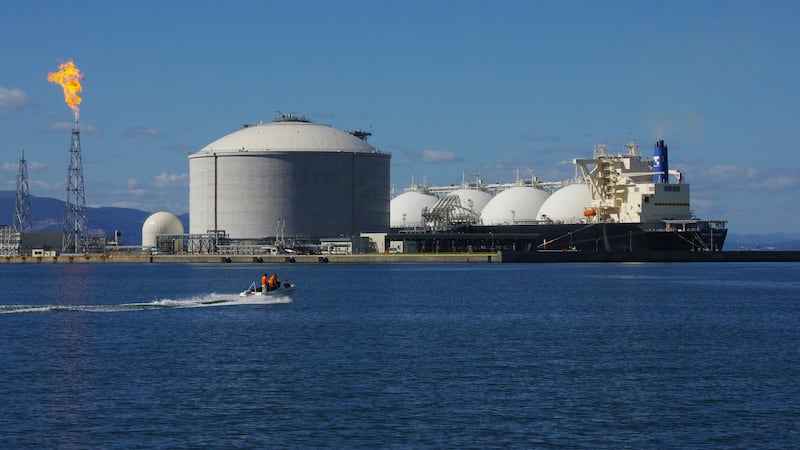The staff of the Oregon Department of Energy is recommending the denial of an exemption sought by developers of the proposed Jordan Cove liquified natural gas project in Southern Oregon.
If built, the project would be by far the most expensive project in Oregon history—but the staff rejection could place another obstacle in a process that began in 2004.
Jordan Cove is also an issue in the governor's race: The challenger, state Rep. Knute Buehler (R-Bend) is an enthusiastic supporter, while incumbent Gov. Kate Brown, a Democrat, has remained neutral.
In June, Jordan Cove asked ODOE for an exemption to the typical regulatory process for a power generating plant that would be part of the project.
Under Oregon law, any new power plant with generating capacity of 25 megawatts or more needs regulatory approval from the state Energy Facility Siting Council. Jordan Cove would have 90 megawatts of capacity to power the LNG terminal.
The siting council is scheduled to meet Sept. 27 to consider Jordan Cove's request for exemption. The staff recommendation, while not binding, makes it likely the council will require Jordan Cove to go through the site certificate process. It's unclear how long that process would take.
ODOE talking points on the staff decision, obtained by WW through a public records request, explain the rationale for the recommendation.
"Exemptions depend on meeting an efficiency threshold," the agency talking points say. "An engineering analysis of the proposed facility undertaken by ODOE found that the plant's fuel efficiency was not high enough."
The regulatory process for Jordan Cove is extensive, requiring numerous local and state permits in addition to approval from FERC.
The long-planned project, backed by the Pembina Pipeline Corporation of Calgary, includes a 229-mile pipeline from Malin, Ore. to Jordan Cove in Coos Bay. Pembina proposes to invest $8 billion to $10 billion in building the pipeline and an export terminal that would ship LNG overseas.
Jordan Cove appeared dead when the federal Energy Regulatory Commission denied its permits in 2016, citing heavy opposition from affected landowners and a lack of customer contracts that would demonstrate demand.
But the project got new life under the Trump administration, which is more favorably disposed to fossil fuel projects than was the Obama administration. Pembina refiled its application with FERC the month after Trump won election.
The project has generated strong support from trade unions, who covet the 2,000 construction jobs Pembina says it would create, and from business interests anxious to boost Coos Bay's moribund economy. A variety of groups oppose it just as passionately: landowners who don't want a pipeline going through or near their property, and environmental groups who oppose expanding fossil fuel infrastructure.
Ted Gleichman, a member of the national Sierra Club's anti-LNG team, which has been involved in opposing Jordan Cove, says he's pleased at the ODOE staff recommendation.
"These Canadian energy speculators are trying to get around Oregon law just to save money on the largest and most dangerous project of any kind in the state's history," Gleichman says. "Kudos to the agency staff for seeing though this."
Michael Hinrichs, a spokesman for the Jordan Cove project, said in a statement he still hopes his group can obtain an exemption.
"We are reviewing the draft recommendation from the Oregon Department of Energy staff and continue to work with staff on our site certificate exemption application," Hinrichs said.
In the meantime, permitting processes continue at other state agencies, including the Oregon Department of Environmental Quality and the Division of State Lands. At the federal level, FERC recently announced that it hopes to publish draft environmental impact statement for the project in February 2019.
If the siting council follows the staff recommendation to reject Jordan Cove's exemption, one possible work-around, according to the ODOE talking points, is that the permitting process for the proposed power plant could be included in FERC's review.
